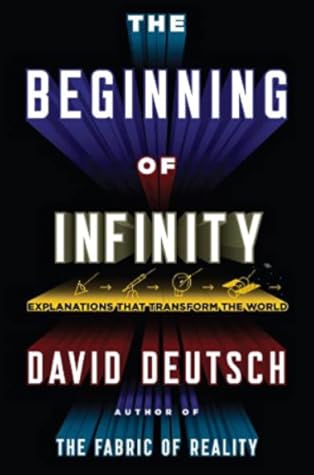More on this book
Community
Kindle Notes & Highlights
Read between
December 12, 2021 - February 7, 2022
As the ancient philosopher Heraclitus remarked, ‘No man ever steps in the same river twice, for it is not the same river and he is not the same man.’
the real key to science is that our explanatory theories – which include those interpretations – can be improved, through conjecture, criticism and testing.
The misconception that knowledge needs authority to be genuine or reliable dates back to antiquity, and it still prevails.
So it is fallibilism, not mere rejection of authority, that is essential for the initiation of unlimited knowledge growth – the beginning of infinity.
But one thing that all conceptions of the Enlightenment agree on is that it was a rebellion, and specifically a rebellion against authority in regard to knowledge.
What was needed for the sustained, rapid growth of knowledge was a tradition of criticism.
Testability is now generally accepted as the defining characteristic of the scientific method. Popper called it the ‘criterion of demarcation’ between science and non-science.
Knowledge that is both familiar and uncontroversial is background knowledge.
predictive theory whose explanatory content consists only of background knowledge is a rule of thumb.
Solving a problem means creating an explanation that does not have the conflict.
theories can contradict each other, but there are no contradictions in reality, every problem signals that our knowledge must be flawed or inadequate.
The quest for good explanations is, I believe, the basic regulating principle not only of science, but of the Enlightenment generally.
inventing falsehoods is easy, and therefore they are easy to vary once found; discovering good explanations is hard, but the harder they are to find, the harder they are to vary once found.
John Haldane, who expected that ‘the universe is not only queerer than we suppose, but queerer than we can suppose.’
Since the Enlightenment, technological progress has depended specifically on the creation of explanatory knowledge.
This increasingly intimate connection between explaining the world and controlling it is no accident, but is part of the deep structure of the world.
human reach is essentially the same as the reach of explanatory knowledge itself.
if knowledge of a suitable kind were instantiated in such an environment in suitable physical objects, it would cause itself to survive and would then continue to increase indefinitely.
Here is another misconception in the Garden of Eden myth: that the supposed unproblematic state would be a good state to be in. Some theologians have denied this, and I agree with them: an unproblematic state is a state without creative thought. Its other name is death.
progress is both possible and desirable is perhaps the quintessential idea of the Enlightenment.
The fact that everything that is not forbidden by laws of nature is achievable, given the right knowledge. ‘Problems are soluble.’
new explanations create new problems.
good adaptations, like good explanations, are distinguished by being hard to vary while still fulfilling their functions.
A good design is hard to vary:
‘evolution by natural selection’ – though a better name would have been ‘evolution by variation and selection’.
If the best-spreading genes impose sufficiently large disadvantages on the species, the species becomes extinct.


